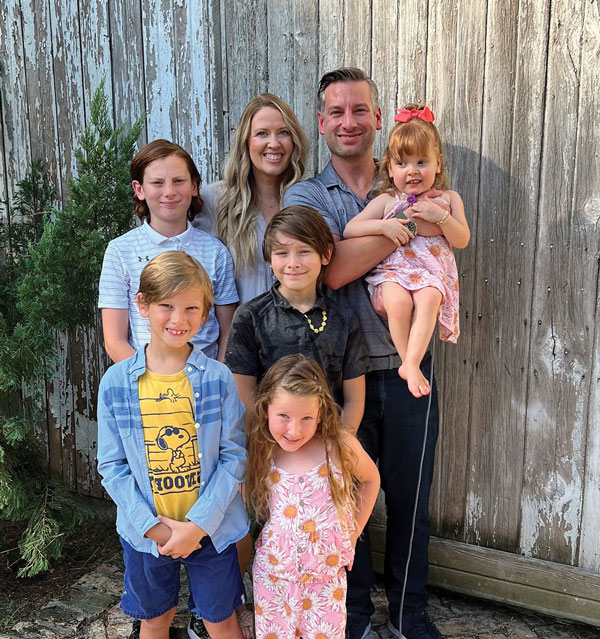McGovern Medicine: Comprehensive care for complex patients

This story was originally published in McGovern Medicine, an annual publication by McGovern Medical School. View the entire issue of McGovern Medicine.
Improving access to care via telemedicine was one of the silver linings of the COVID-19 pandemic. Years before its now ubiquitous use, the Department of Pediatrics introduced telemedicine to a clinically fragile population – children with medical complexity.
A two-year clinical study started in 2018 showed that the addition of telemedicine to comprehensive care for medically complex children reduced care days outside the home, serious illnesses, as well as health care costs. The results of the study were published in Pediatrics in 2021.
Medically complex children account for only .4 percent of all children but are responsible for about 40 percent of pediatric deaths and 53 percent of all pediatric hospital charges. These patients have challenging, chronic health care issues that require high-resource needs, including medical devices for daily functioning.
To care for these medically complex children at all hours, UT Physicians developed an outpatient comprehensive care program, which includes hospital consultation with Children’s Memorial Hermann Hospital, telemedicine, social workers, nutritionists, mental health professionals, and a lab. This 360-degree approach led by Ricardo Mosquera, MD, MPH, professor and director of the Division of Pediatric Pulmonary, Allergy/Immunology and Sleep, has reduced serious illnesses, hospital days, pediatric intensive care unit days, and health system costs for these vulnerable patients.
“Adding telemedicine to treat these patients has been highly beneficial, since many of these families face financial, transportation, and health system obstacles, particularly for technology-dependent medically complex children. Plus, any time spent in a medical setting imposes a risk of acquiring serious, even life-threatening, infections,” Mosquera added.
Ashley Kennedy, mom to patient Madelynn, age 2, praised the approach. “Telemedicine has been a very quick and efficient means of care for Maddie,” Kennedy said. “Traveling by ambulance stressed her out, but with telemedicine, her team can see her movements and make a diagnosis over the phone.“
Born at 25 weeks, Maddie has undergone various surgeries for her bronchopulmonary dysplasia, tracheobronchomalacia dysplasia, pulmonary hypertension, and retinopathy. She functions with a gastrostomy tube and a tracheostomy tube.
“I would describe the care from the clinic as above and beyond,” Kennedy said. “The team that surrounds Maddie is just the best and truly listens to anything we have concerns about and helps address those concerns together to provide our little girl with the best possible care. We have 24/7 access and personal phone numbers in case an emergency arises.”
Mosquera opened the UT Physicians High-Risk Children’s Clinic 13 years ago with one patient; today there are 600.
“Over the years, our patients have become more complex, which requires us to involve all of the stakeholders in their care, including insurance companies and device makers,” he said.
Following graduation from medical school and pediatric residency in his native Colombia, Mosquera moved to Eagle Pass, Texas, where he served as a pediatrician in a medically underserved area as part of immigration requirements.
“I wanted to do ICU or pedi pulmonary, so then I came to Houston to do my pulmonary fellowship,” he said.
Knowing the primary care world as well as the specialty world provides Mosquera a unique perspective on high-risk pediatric patients. “Eighty-five percent of the problems our patients have are pulmonary problems,” he said.
Beyond his background and experience, for Mosquera, the care of these patients is personal. “My daughter, Emily, is 21 and has Down syndrome. She is my inspiration for everything I do with the children,” he explained.

In an effort to further impact the health care costs of this patient population, in December 2022, the High-Risk Program partnered with two managed care organizations as participants in the Kids Pilot Program of STAR Kids. Working with Medicaid providers, Amerigroup and STAR Kids, a monthly fee covers the comprehensive care of 150 patients in the program.
“Providing a comprehensive system is not cost-effective in a fee-for-service model,” Mosquera said, adding that each high-risk provider sees four to five patients a day, versus a traditional doctor who sees about 20 patients per day.
The clinic’s latest program provides telemedicine devices for home use to 300 patients. The TytoCare devices are used by the patient’s caregiver to produce high-quality sounds of the heart and lungs; images and videos of the ears, throat, and skin; and body temperature for home exams.
“If we want to improve the outcomes of our patients, we have to be accessible and always listen to the family members who are their constant caregivers,” Mosquera said.
Kennedy said this approach is working for Maddie. “Having honest conversations about what we are noticing or seeing with Maddie helps her medical team and us come up with the best solution to the problem she is having and in a timely manner. It’s powerful when you have everyone on the same page to provide Maddie with the best care possible, absolutely amazing.
“We haven’t had any hospitalizations in the last six months, which is a huge win for Maddie, and we are in the process of having her trach come out. We believe this progress is because of the consistent care with her whole team,” she said.